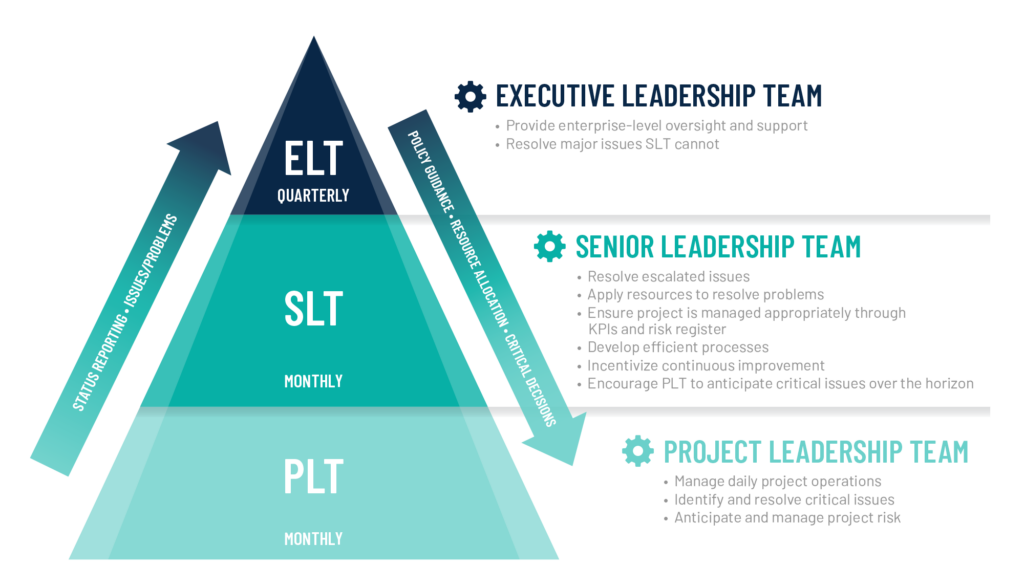


Large projects and programs can benefit from the use of skilled facilitators who help develop higher-performing teams, implement project management best practices and processes, and promote proactive risk management. Our team of facilitators are construction professionals with a wealth of experience in design, construction, and operations. They understand the project life cycle and are well-versed in industry’s best practices. Together, MBP’s facilitators and the services we provide:
The return on investment for value engineering is exponential. Savings can be achieved in design, construction, operations, and maintenance, reducing overall life cycle costs. Led by our facilitation team including a Certified Value Specialist, we conduct value engineering workshops where project improvement ideas are generated, evaluated, and ultimately developed into discrete value engineering proposals to present to project stakeholders for potential incorporation into the project. These workshops provide an opportunity to study the cost implications of project options before the design is advanced, thereby saving cost, time, and possible redesign efforts and enhancing the final project’s success in meeting the owner’s expectations.
PDRI is a tool developed by the Construction Industry Institute (CII) to measure the level of scope definition of a project or program. Conducted early in a project’s development, PDRI very effectively identifies the risk factors which could impact project outcomes. MBP’s PDRI-trained facilitator lead PDRI workshops with project stakeholders to comprehensively review the project and identify gaps and action items, all intended to reduce risk through extensive front-end planning.
All projects require a clear governance structure to ensure effective communication, accountability, transparency, and timely decision-making. For large, complex projects, especially those with numerous stakeholders, a project governance structure may require several tiers of leadership and clearly defined lines of communication. MBP’s facilitators manage this governance process, incorporating partnering and risk management elements, to enhance how teams interact.

Bringing individuals together as a higher-performing project or program team requires forethought and planning. Incorporating a formal partnering program builds trust, improves communication, and enhances issue resolution. MBP’s neutral facilitators lead partnering workshops, help teams craft partnering agreements and sign project charters that define overall objectives, establish an issue escalation matrix, identify key performance indicators (KPI) to gauge success, and utilize regular surveys of team performance.
Project risk management is not only a tool, it is a behavior learned by a project team to promote project success. MBP’s risk facilitators encourage project teams to be forward-looking and proactive and to engage every team member to deliberately prioritize and allocate resources where they are needed most. This comes in the form of facilitated risk workshops so that clients can ensure that risk management is successfully implemented and maintained.
The Construction Readiness Assessment (CRA), a methodology developed by the Construction Industry Institute (CII), is a project management tool used during the latter stages of design to monitor project health, prevent premature construction starts, and avoid out-of-sequence work. It addresses a common challenge in our industry: the pressure to begin construction too soon, which can result in productivity loss and cost and schedule overruns. The readiness assessment process starts with a facilitated workshop led by experts at MBP. During this collaborative session, project stakeholders evaluate each construction readiness indicator and establish a standardized, objective approach to ensure a smooth start to construction.
MBP’s team of certified Lean CMs assist clients in adopting a Lean mindset and implementing Lean methods to improve their projects, programs, and enterprises. MBP’s facilitators offer clients workshops in project delivery strategies and practice tools and practices and offer instruction for Lean CM certification. As the Lean Construction Institute notes, the principles of Lean are (1) optimize the whole, (2) remove waste, (3) focus on process and flow, (4) generate value, (5) continuously improve, and most importantly, (6) respect people.
Given the complexity and risk associated with construction, it can be challenging to navigate complex issues and changes. Project teams may require an independent voice to facilitate difficult discussions and assist the team in arriving at shared project success. MBP offers clients a team of independent facilitators to assist project teams with resolving contentious issues, negotiating large or complex changes, developing schedule recovery strategies, and other topics.
As project teams achieve milestones in major projects and programs, it is important to set aside time to review outcomes, assess root causes of positive and negative results, plan for desired future outcomes, and commit to improving. MBP’s facilitators conduct workshops to collect lessons learned, compile those findings, and assist clients in developing action plans to incorporate lessons into their processes and systems.
MBP’s specialized optimization services are focused on maximizing an owner’s investment by identifying performance enhancements or discovering efficiency improvements in operational processes. MBP’s Lean Six Sigma-trained facilitators gather client staff as workshop participants to generate ideas to improve internal processes. Through these facilitated workshops, organizations identify means to increase the efficiency of operations, enhance team building, decrease costs, and increase revenue.